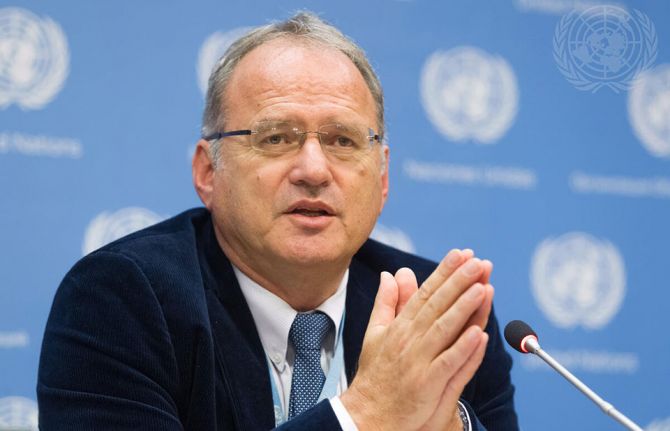

Feature Story
UNAIDS joins human rights community in mourning Christof Heyns, legal academic and expert
31 March 2021
31 March 2021 31 March 2021By Patrick Eba, UNAIDS Country Director for the Central African Republic
Tributes have been pouring in since the announcement of the sudden passing of Christof Heyns, the South African human rights academic and expert. For Amnesty International, he was, “A baobab in the human rights world. A giant in his field, [who] fought hard for a just world.” For Edwin Cameron, a former judge of the Constitutional Court of South Africa and a leading global voice on HIV and human rights, “[Christof] was a meticulous, conscientious, persistent, courageous fighter for justice and human rights.”
A former member of the United Nations Human Rights Committee (2017–2020), Mr Heyns served as the United Nations Special Rapporteur for Extrajudicial Execution from 2010 to 2016 and as a member of the Working Group on Death Penalty, Extra-Judicial, Summary or Arbitrary Killings and Enforced Disappearances in Africa of the African Commission on Human and Peoples’ Rights. In 2015–2016, he chaired the United Nations Independent Investigation on Burundi.
Mr Heyns was one of the world’s most prominent experts on the African human rights system. He was the Director of the Centre for Human Rights at the University of Pretoria from 1999 to 2006 and Dean of the Law Faculty from 2007 to 2010. He later helped to establish and led the Institute for International and Comparative Law in Africa at the same university.
To many of his students, colleagues and partners, he was an accessible lecturer, a trusted ally and a thought leader who embodied the values of excellence with ubuntu (humanity). I first met Mr Heyns in August 2001 as a third-year law student representing the University of Abidjan in Côte d’Ivoire at the 10th African Human Rights Moot Court competition in Pretoria, South Africa. It was an exhilarating opportunity. This was my first-ever air travel. And It took me to no other place than South Africa, the land of Nelson Mandela, the (then) vibrant beacon of human rights optimism. The theme for the continental oratory joust that year focused on human rights violations against people living with HIV—how fitting.
Some two years later, I was privileged to be awarded a scholarship to join what is arguably one of Mr Heyns’s most enduring legacies, the Centre for Human Rights’ master’s programme on human rights and democratization in Africa. Since 2000, this programme has trained a generation of human rights scholars, practitioners and activists from across Africa and other parts of the world. During his tenure as the Director, Mr Heyns enabled the transformation of the Centre for Human Rights into a world-class academic and activist institution that took an active role in education, advocacy and litigation.
As he later became involved as a member of United Nations human rights mechanisms, Mr Heyns took with him the values of dialogue and academic generosity that he had honed in South Africa. In a world that overemphasizes uniqueness, he was an internationalist who championed experience-sharing and cross-fertilization across human rights systems. It was thus naturally that UNAIDS and the Office of the United Nations High Commissioner for Human Rights turned to him when we were seeking allies for a joint dialogue on the human rights norms and practice relating to sexual orientation and gender identity between the African Commission on Human and Peoples’ Rights, the Inter-American Commission on Human Rights and the United Nations from 2015 to 2018. Mr Heyns was at the time the United Nations Special Rapporteur on Extrajudicial Executions and I was working as the Senior Human Rights and Law Adviser with UNAIDS in Geneva, Switzerland. Throughout the process, Mr Heyns was generous with his ideas, and, as ever, courteous and considerate with his peers as well as with support staff.
This year will mark 30 years since the creation of the African Human Rights Moot Court competition. We will miss Mr Heyns but his spirit will be with us as we mark this milestone. Across Africa and globally, his legacy will live on with those he defended as a human rights expert, and in the continued fight for justice and democratization of the thousands of students, academics, practitioners and activists that he has supported and nurtured.
Au revoir professor, the struggle approach to human rights shall continue.
“It is argued that legitimate resistance is the conceptual and historical counterpart and the ultimate guarantor of human rights. Human rights = legitimate resistance … The ongoing nature of history is emphasized, as well as the creative potential of members of the present generation to influence history, and as such the nature of human rights, through their struggles.” Christof Heyns, 10 January 1959–28 March 2021.
Christof Heyns, third from left (front row) with other participants during the joint thematic dialogue on sexual orientation and gender identity between the African Commission on Human and Peoples’ Rights, the Inter-American Commission on Human Rights and the United Nations, 3 November 2015, Kairaba Hotel, Banjul, the Gambia. Credit: UNAIDS



